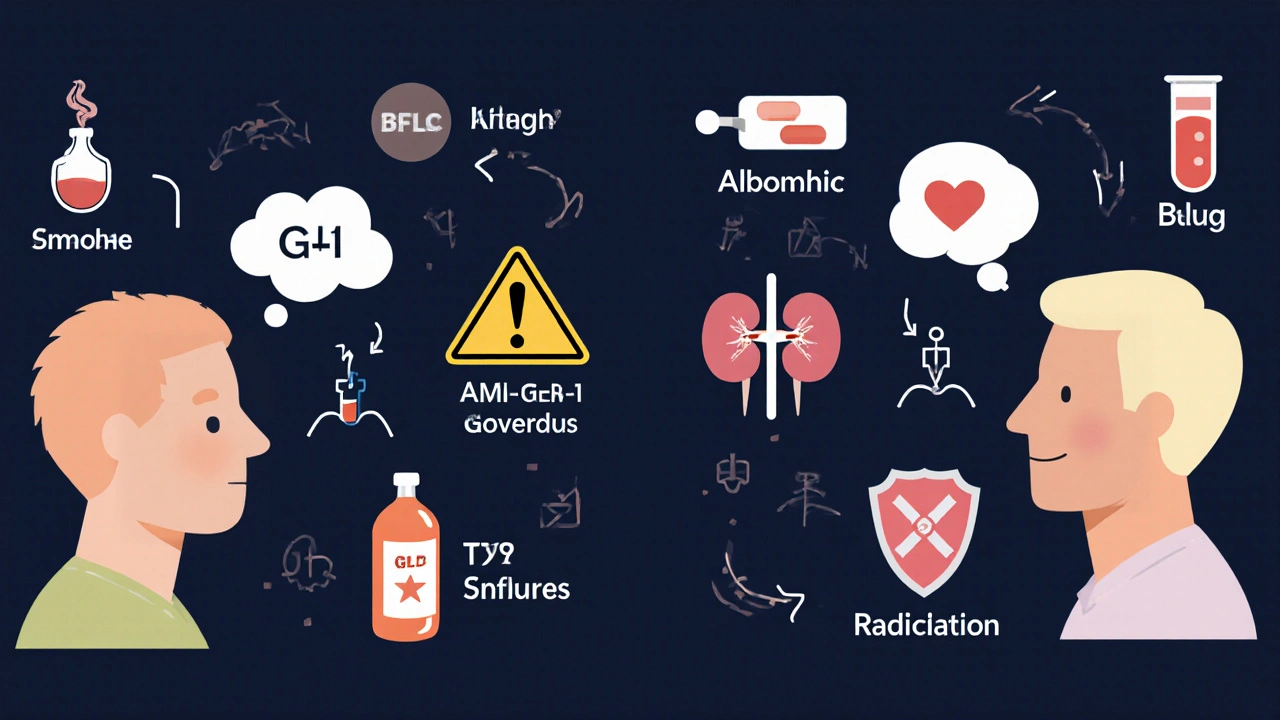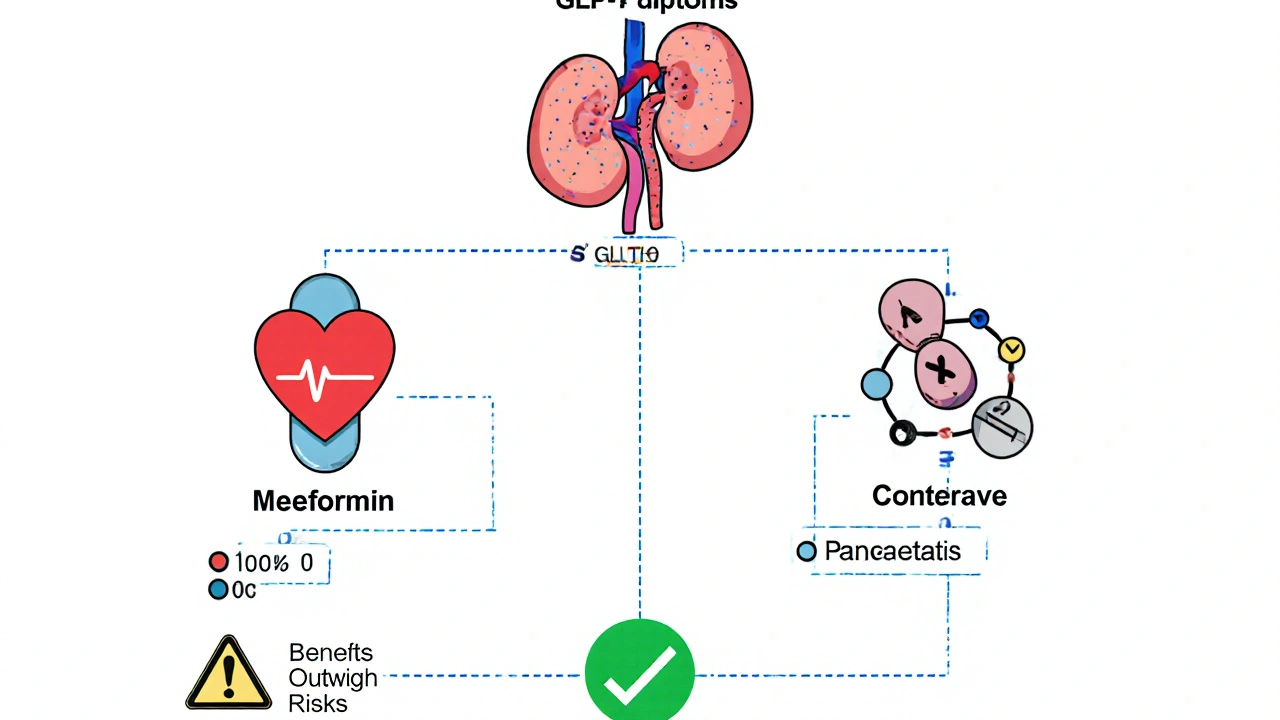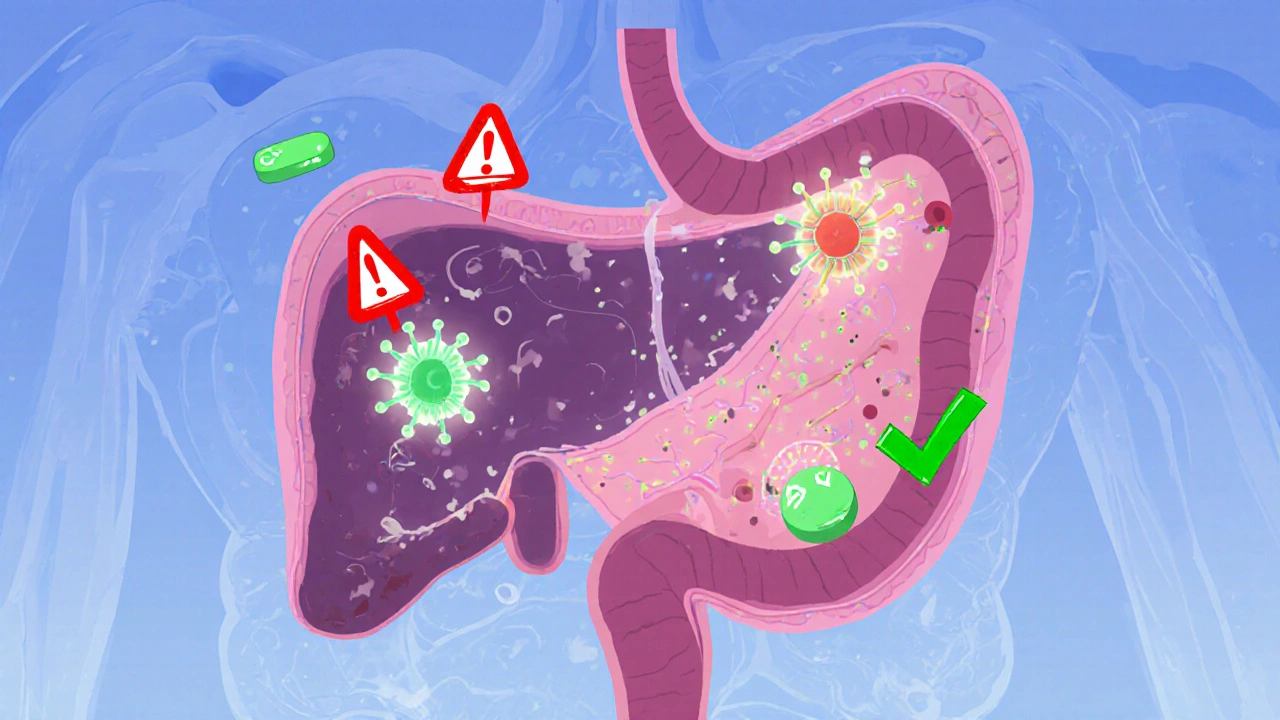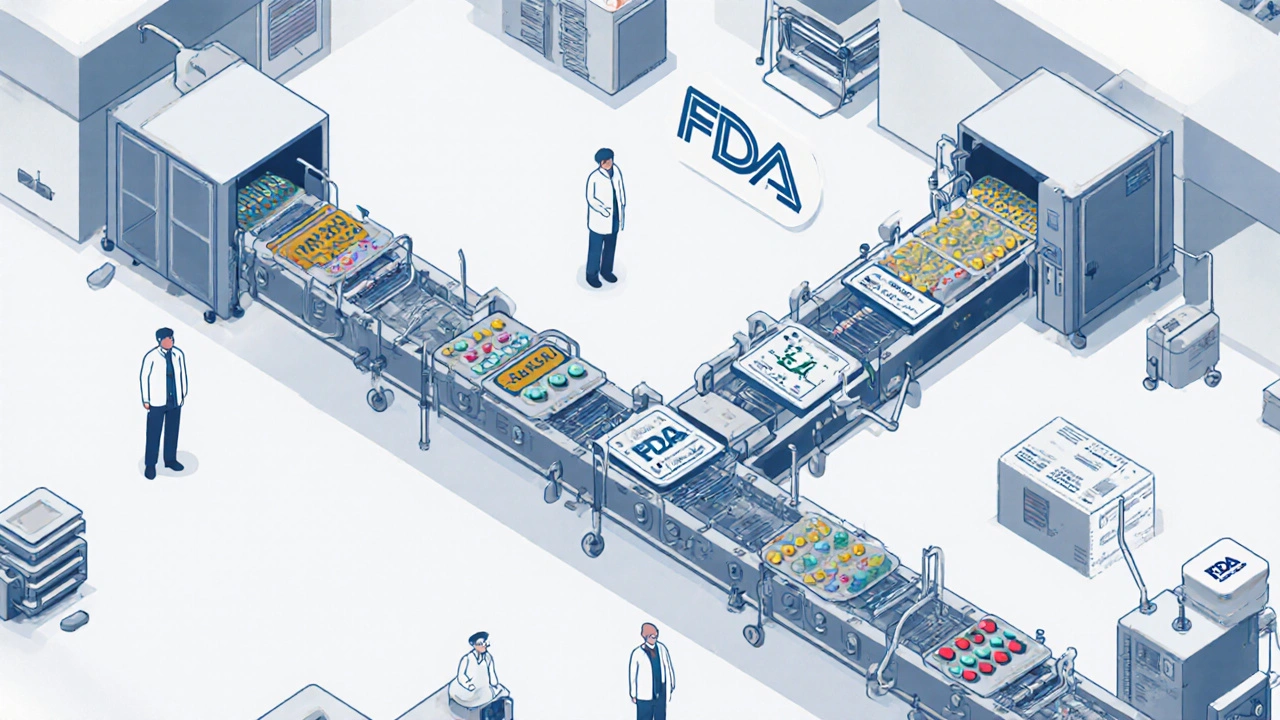GLP-1 Pancreatitis Risk Assessment Tool
Personalized Risk Assessment
This tool helps evaluate your individual pancreatitis risk when considering GLP-1 agonists like Ozempic or Wegovy based on your health profile.
Risk Assessment
When you start taking a GLP-1 agonist like Ozempic or Wegovy for weight loss or diabetes, you’re getting a powerful tool. These drugs help you lose weight, lower blood sugar, and reduce heart risks. But there’s a quiet concern that keeps popping up in doctor’s offices and online forums: Could this cause pancreatitis? The answer isn’t simple. Some studies say yes. Others say no. And your doctor might not be giving you the full picture.
What Are GLP-1 Agonists, Really?
GLP-1 agonists are synthetic versions of a natural hormone your body makes after eating. This hormone tells your pancreas to release insulin when blood sugar rises. It also slows down your stomach, so you feel full longer. That’s why people lose weight on these drugs.
The first one, exenatide (Byetta), came out in 2005. Since then, we’ve seen liraglutide (Victoza, Saxenda), semaglutide (Ozempic, Wegovy), and tirzepatide (Mounjaro, Zepbound). These aren’t just diabetes drugs anymore. In 2023, semaglutide brought in nearly $20 billion in global sales. Millions of people are on them. And the numbers keep climbing.
But here’s the catch: these drugs activate receptors in your pancreas. That’s good for insulin. But some scientists worry it might also trigger inflammation. That’s where pancreatitis comes in.
Pancreatitis Risk: The Science Is Split
Let’s cut through the noise. Two major studies from early 2025 gave opposite answers.
A May 2025 study of nearly a million diabetic patients found GLP-1 users had a 44.5% higher risk of chronic pancreatitis over five years. That’s not small. It’s enough to make you pause.
But a February 2025 study of nearly a million more patients found the opposite. GLP-1 users actually had a slightly lower lifetime risk of pancreatitis than non-users. The difference? 0.3% vs. 0.4%. It’s tiny. But statistically, it mattered.
Then there’s the JAMA study from 2023 that compared GLP-1 agonists to bupropion-naltrexone (Contrave). It found GLP-1 users had up to 9 times higher risk. But that study only included about 5,000 people total. Small sample. Big red flag.
And here’s something most people don’t know: a 2024 study at ENDO showed GLP-1 agonists might actually reduce the chance of pancreatitis coming back in people who’ve had it before. That’s the opposite of what everyone thought.
So what’s going on? The truth is, the data is messy. Some studies are huge. Others are small. Some look at new users. Others track people for years. And pancreatitis itself is rare - even in diabetics, only about 0.1% to 0.4% of people get it over five years.
Who’s Actually at Risk?
If you’re worried, you’re not alone. But not everyone is equally at risk. The American College of Gastroenterology found three big red flags:
- History of heavy drinking or alcohol use disorder
- Smoking
- Chronic kidney disease (stage 3 or worse)
Here’s the surprise: if you’ve had pancreatitis before, you’re not at higher risk of getting it again on a GLP-1 agonist. That’s what Dr. Robert Postlethwaite from UT Southwestern found. So if your doctor says, “Don’t take this because you had pancreatitis in 2018,” they’re wrong.
And here’s another twist: people with a BMI over 36 may be protected. The higher your weight, the lower your risk - which is ironic, since these drugs are mostly used by people with obesity.
One study found risk goes up with higher doses and longer use. That makes sense. More drug = more effect on the pancreas. But again, the absolute risk is still low.

What You Should Monitor
You don’t need blood tests every week. But you do need to know the signs.
Acute pancreatitis hits fast. Symptoms include:
- Sudden, severe pain in your upper belly - often described as “stabbing” or “burning”
- Pain that radiates to your back
- Nausea and vomiting that won’t stop
- Fever or rapid heartbeat
If you get any of these, stop the drug and go to urgent care. Don’t wait. Pancreatitis can turn serious fast.
For monitoring: if you have any of the three risk factors above (alcohol, smoking, kidney disease), get a lipase and amylase blood test every 3 months for the first year. After that, only test if you feel something off.
For everyone else? No routine blood work needed. Just know the symptoms. That’s it.
Alternatives That Won’t Trigger Pancreatitis
If you’re nervous about GLP-1 agonists, there are other options - and some are safer for your pancreas.
SGLT2 inhibitors (like Jardiance, Farxiga, Invokana) are a top choice. They lower blood sugar by making your kidneys flush out glucose. They don’t touch the pancreas. In fact, one 2024 study found they might increase pancreatitis risk slightly compared to GLP-1 agonists - but that’s because GLP-1 agonists might be protective. Bottom line: SGLT2s are neutral. Safe.
Metformin is still the first-line drug for type 2 diabetes. Its pancreatitis risk? About 0.15 per 1,000 patient-years. That’s lower than most other diabetes drugs.
DPP-4 inhibitors are trickier. Sitagliptin (Januvia)? Safe. Saxagliptin (Onglyza)? Not so much. It carries a black box warning. Avoid it if you have any pancreas concerns.
Bupropion-naltrexone (Contrave) is an option for weight loss. The JAMA study showed it had 4 to 11 times lower pancreatitis risk than GLP-1 agonists. But it’s not for everyone. If you have seizures, an eating disorder, or are on antidepressants, don’t use it.
Orlistat (Xenical) blocks fat absorption. No pancreatic risk. But it causes oily stools, gas, and frequent bathroom trips. About 40% of people quit within a year because of the side effects.
And what about tirzepatide (Mounjaro)? It’s a dual agonist - hits both GLP-1 and GIP receptors. It’s newer. We don’t have long-term data yet. The FDA is requiring a post-marketing study that won’t finish until 2027. So if you’re worried about pancreatitis, don’t assume it’s safer just because it’s newer.

The Big Picture: Benefits vs. Risks
Let’s not forget why these drugs are so popular. GLP-1 agonists don’t just help you lose weight. They lower your risk of heart attack, stroke, and kidney failure. In people with heart disease, semaglutide reduces cardiovascular death by 26%. That’s huge.
The European Medicines Agency reviewed everything in 2024 and said: “Benefits outweigh risks.” That’s the official stance. And they’re not wrong.
But here’s the real question: are you the person who benefits? Or are you the one who’s just trying to lose 10 pounds and doesn’t need a drug that could inflame your pancreas?
If you have type 2 diabetes and heart disease - yes, take it. If you’re obese with no other health issues and just want to look better - maybe think twice. Talk to your doctor about metformin or SGLT2 inhibitors first.
The goal isn’t to scare you off GLP-1 agonists. It’s to help you make an informed choice. You’re not just choosing a drug. You’re choosing a risk profile. And you deserve to know what you’re signing up for.
What Comes Next?
Researchers are already working on next-gen GLP-1 drugs that avoid pancreatic receptors. No one’s on the market yet, but it’s coming. In the meantime, the focus is shifting from “Are they dangerous?” to “Who should avoid them?”
Doctors are starting to screen better. Ask about your alcohol use. Your smoking history. Your kidney function. Your past pancreatitis. If you’re a smoker with stage 3 kidney disease, maybe start with metformin and lifestyle changes.
And if you’re on a GLP-1 agonist and feel fine? Keep going. Most people are. The risk is low. The benefits are real.
Just stay alert. Know the symptoms. Don’t ignore pain. And don’t let fear stop you from getting help - but don’t let hype push you into something you don’t need.
Do GLP-1 agonists like Ozempic really cause pancreatitis?
The evidence is mixed. Some large studies show a small increased risk, especially with long-term use and in people with risk factors like smoking or kidney disease. Other studies, including a 2024 analysis of over 127 million patients, found no increased risk - and even suggested a possible protective effect. The absolute risk remains low, at 0.1% to 0.4% over five years. The FDA requires a warning, but most experts agree the benefits outweigh the risks for most patients.
If I had pancreatitis before, can I still take GLP-1 agonists?
Yes. Contrary to old advice, recent research shows having a past episode of pancreatitis does not increase your risk of recurrence when starting a GLP-1 agonist. The American College of Gastroenterology specifically states these drugs should not be withheld based on prior pancreatitis history. If your doctor says no, ask them to review the 2024 ENDO findings.
What symptoms should I watch for?
Watch for sudden, severe pain in your upper abdomen - often described as stabbing or burning - that radiates to your back. Nausea, vomiting, fever, or a rapid heartbeat can follow. Symptoms usually get worse after eating. If you experience any of these, stop the medication and seek medical attention immediately. These are signs of acute pancreatitis, which can become serious quickly.
Are there safer alternatives to GLP-1 agonists for weight loss?
Yes. SGLT2 inhibitors like Jardiance or Farxiga have no known link to pancreatitis and offer heart and kidney benefits. Metformin is the safest first-line option for diabetes and has minimal pancreatic risk. For weight loss, bupropion-naltrexone (Contrave) has significantly lower pancreatitis risk than GLP-1 agonists, but it’s not suitable for people with seizures or psychiatric conditions. Orlistat is another option with no pancreatic risk, though side effects like oily stools make it hard to stick with.
Should I get blood tests before starting a GLP-1 agonist?
Only if you have risk factors: smoking, heavy alcohol use, or chronic kidney disease. In those cases, check lipase and amylase levels before starting and repeat every 3 months for the first year. For low-risk patients, routine testing isn’t needed. Focus instead on knowing the symptoms of pancreatitis. If you feel fine, no blood test is required.








13 Comments